It is natural for the poor man to beg, and it is natural for man made poor by the fall into sin to pray.
Prayer is the appeal of fallen and repenting man to God. Prayer is the weeping of fallen and repenting man before God. Prayer is the outpouring before God of the heart-felt wishes, requests, sighs of man fallen and slain by sin.

The first manifestation, the first movement of repentance is weeping of the heart. This is the prayerful voice of the heart, anticipating prayer of the mind. And soon the mind, taken up in the prayer of the heart, begins to give birth to prayerful thoughts.
God is the only source of all true good. Prayer is the mother and head of all virtues, [1] as the means and fortune of man’s communion with God. It adopts virtues from the source of good—God,—makes them part of the man who by prayer strives to dwell in communion with God.
The way to God is prayer. The measurements of the journey traveled are the various states of prayer which the person praying correctly and constantly gradually enters into.
Learn to pray to God correctly. Having learned to pray correctly, pray constantly,—and you will comfortably inherit salvation. Salvation appears from God in its own time, making itself known irrefutably to him who prays correctly and constantly.
For prayer to be correct, it must be offered from a heart filled with poverty of spirit, from a contrite and humble heart. As for all other states of the heart, consider them, until the heart’s renewal by the Holy Spirit,—and this is exactly what they are—unnatural for the repenting sinner begging God for forgiveness of his sins and for liberation from enslavement to the passions—as from a prison and bonds.
It was prescribed by the Law of Moses for the Israelites to offer all their sacrifices in only one place, designated by God. And by the spiritual law there is designated for Christians one spiritual place for the offering of all their sacrifices, and in particular the sacrifice of sacrifices—prayers. This place is humility.
God does not need our prayers! He knows what we need beforehand—our request, what we have need of; He, the Most Compassionate, pours out abundant mercies also on those who do not ask them of Him. It is fur us that prayer is indispensable; it makes man part of God. Without it man is alien to God; but the more he exercises in prayer, the more he draws near to God.
Prayer is the communion of life. Abandoning it brings unseen death to the soul.
What air is for the life of the body, the Holy Spirit is for the life of the soul. By means of prayer, the soul breathes this holy, mysterious air.
When you arise from sleep, let your first thought be of God; offer to God the very beginning of your thoughts, still unmarked by any vain impression. When you go to sleep, when you prepare to sink into this image of death, let your last thoughts be of eternity and of God Who reigns therein.
An angel revealed to a certain holy monk the following order of thoughts in prayer which is pleasing to God. “The beginning of prayer should consist of praise of God, of thanksgiving to God for His numberless benefits; then we should offer to God the sincere confession of our sins, in contrition of spirit; in conclusion we can include, though with great humility, requests to the Lord for our spiritual and bodily needs, reverently leaving the fulfilment or nonfulfillment of these requests to His will” [2].
The initial cause for prayer is faith; I believed, therefore have I spoken [3] by my prayer to the compassionate God, Who deigned to give me the commandment of prayer and Who gave the promise to attend to it.
What things soever ye desire, when ye pray, believe that ye receive them, and ye shall have them, the Lord promised [4]. And therefore, having rejected every doubt and duplicity of spirit, persistently dwell by prayer before the Lord, Who commanded always to pray and not to faint [5], that is, not to pass into despair at the narrowness of prayer, which, especially at the beginning, is burdensome, unbearable for the mind accustomed to wandering every which way.
Blessed is the soul which by prayer incessantly knocks at the door of God’s compassion, and by complaints against its brother (Luke 18:3)—against sin which violates it—incessantly wearies the Indefatigable [6]; in its own time it will rejoice over its purity and over its passionlessness.
God does not need our prayers! He knows what we need even before we ask it. He, the All-Merciful, gives bountiful gifts even to those who do not ask for them. We need prayer—it unites us with God. Without it, a person is unknown by God, while the more he becomes adept at prayer, the closer he comes to God.
Prayer is communion of life itself. Leaving it brings unseen death to the soul.
What air is for the life of the body, the Holy Spirit is for the life of the soul. The soul breathes this holy, mystical air through prayer.
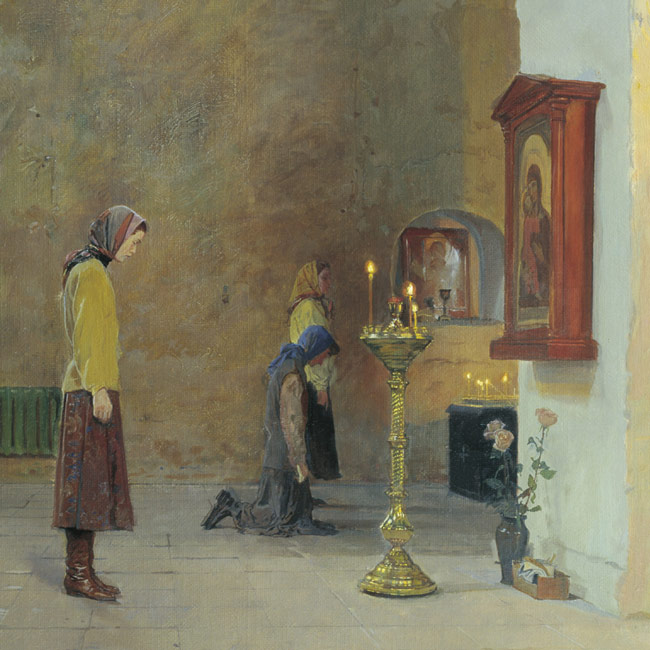
When you rise from sleep, let your first thought be of God. Bring to God the very beginning of your thoughts before they have been spoiled by any worldly impressions. When you lie down to sleep, when you ready yourself to descend into this image of death, let your last thoughts be of eternity and God who rules over eternity.
An angel once revealed to a holy monk the following proper progression of thoughts in God-pleasing prayer: “The beginning of prayer should consist of praise for God coming out of gratitude for his countless gifts; then we must bring to God a sincere confession of our sins, with pain of heart, and only in conclusion can we bring, and only with the greatest humility, our petitions to the Lord for the needs of our soul and body, leaving the fulfillment of these petitions completely to His will.” [7]
The first reason for prayer is faith: “I believed, so I spake” [8] with my prayer to the merciful God, who in His goodness commanded me to pray and gave His promise to hear my prayer.
“Whatever things you ask when you pray, believe that you receive them, and you will have them,” said the Lord. [9] And thus, having rejected all doubts and duplicity of heart, let us constantly immerse ourselves in prayer before God, who commanded “always … to pray, and not lose heart;” [10] that is, never to fall into despair because of the difficulty of our prayer, as at first it is heavy and unwieldy for the mind, which has become accustomed to freely wander wherever it wills.
Blessed is the soul that through prayer constantly knocks at the doors of God’s mercy, and through complaints against the “adversary,” [11] that is, sin, constantly tires the Tireless One. [12] Such a soul will rejoice in the appointed time because of its purity and dispassion.
Sometimes our petitions are heard immediately; sometimes, according to the words of our Saviour, “Shall God not avenge His own elect which cry out day and night to Him, though He bears long with them?” [13] In other words, He fulfills our petitions after some delay. He sees that we need some time to be confirmed in our humility, that we need to become tired and to see our sickness, which always reveals itself very unexpectedly when we are faced with ourselves.
Prayer, as conversing with God, of itself is a lofty good, often far greater than that for which a person is praying. The compassionate God, by not fulfilling the petitions, leaves the petitioner in his prayer so that he might not lose it, might not leave this higher good when he receives the good requested which is far smaller.
God does not satisfy requests whose fulfillment is attended by harmful results; He also does not satisfy those requests which are contrary to His holy will, contrary to His all-wise, incomprehensible providence.
Contrary to God’s determination, the great Moses, Beholder of God, asked that he be granted to enter into the promised land, and he was not heard (Deut. 3:26); holy David prayed, intensifying his prayer with fasting, ashes, and tears, for the preservation of the life of his ailing son; but he was not heard (Il Kings12). And you, when your petition is not fulfilled by God, reverently submit to the will of the all-holy God, Who, for unknowable reasons, left your petition unfulfilled.
The holy Apostle James proclaims to the sons of the world who ask worldly benefits for satisfying carnal desires: Ye ask, and receive not, because ye ask amiss, that ye may consume it upon your lusts. [14]
When we wish to stand before an earthly king, we prepare for this with special diligence; we learn what the mood of our heart’s feelings should be during the conversation with him, so as not to be carried away at some whim to a word or movement displeasing to the king; in good time we think out what to say to him, so as to say only what is pleasing, and by this to dispose him favorably to ourselves; we take care that our very outward appearance might attract attention to us. Even more should we make proper preparations when we wish to stand before the King of kings and to enter by prayer into conversation with Him.
Man looketh on the outward appearance, but the Lord looketh on the heart [15]; but in man the disposition of the heart is in conformity to his exterior stance and outward appearance. And therefore in prayer give the most reverent stance to the body. Stand as one condemned, with head bowed, not daring to look up to heaven, with hands at your side or clasped behind you as if bound by ropes, as criminals seized on the site of the crime are usually bound. Let the sound of your voice be the pitiful sound of weeping, the groan of one wounded by a fatal weapon or in agony from a terrible disease.
The Lord looketh on the heart. He sees our most secret, our most subtle thoughts and feelings; He sees all our past and future. God is omnipresent. And therefore stand at your prayer as if you stood before God Himself. In fact you are standing before Him! you are standing before your Judge and sovereign Master upon Whom your fate depends in time and in eternity. Make use of your standing before Him for the arrangement of your well-being; do not allow this standing to serve, because of its unworthiness, as a cause of temporal and eternal punishment for you.

Intending to offer prayer to God, reject all earthly thoughts and cares. Do not occupy yourself with the thoughts which come to you then, however important, brilliant, or needful they might seem. Render what is God’s to God, and you will succeed in rendering what is needed for temporal life in its own time. It is impossible at one and the same time to work for God in prayer and to occupy your mind with extraneous thoughts and cares.
Before prayer cense in your heart with the thyme of fear of God and holy reverence; meditate on how you angered God by countless sins, which are more evident to Him than to your own conscience; strive to mitigate the Judge by humility. Be careful! do not arouse His indignation by carelessness and boldness; He wills that even the purest angelic Powers closest to Him stand before Him with all reverence and holiest fear [16].
The garment of your soul must shine with the whiteness of simplicity. Here there must be nothing complex! there must not be evil thoughts mixed in and feelings of vainglory, hypocrisy, affectation, seeking to please men, highmindedness, passionateness—these dark and stinking blemishes which blot the spiritual garments of the pharisees at prayer.
In place of pearls and diamonds, in place of gold and silver, beautify yourself with chastity, humility, tears of meekness and spiritual reason, and before you receive these tears, with tears of repentance; beautify yourself with infantile, angelic benignancy; these are priceless furnishings! When the King of kings secs these furnishings in your soul, His merciful glances will be inclined to the soul.
The forgiveness of all, all insults without exception, even the deepest ones, is an indespensible condition for succeeding in prayer. And when ye stand praying, the Saviour commands forgive, if ye have ought against any, that your Father also Which is in heaven forgive your trespasses. But if ye do not forgive, neither will your Father Which is in heaven forgive your trespasses [17]. “The prayers of those who hold grudges is sowing on stone,” said St. Isaac the Syrian [18].
Measured, reasonable, constant temperance in food and drink makes the body light, cleans the mind, grants it wakefulness, and therefore likewise serves as a preparation for prayer. In temperance for the belly makes the body heavy, plump, hardens the heart, darkens the mind with a multitude of steams and gasses rising from the stomach to the brain. The overstuffed or sated scarcely stands for prayer, when sleepiness and laziness attack him; a multitude of crude fantasies depict themselves in his imagination; his heart is not capable to come to compunction.
Immoderate fasting is just as harmful as intemperance, or even more so. [19] The weakness of the body which comes from eating too little does not permit one to make his prayers in the necessary quantity and with the necessary force.
The amount of prayers is determined for each by his way of life and by the measure of his spiritual and physical strength. The two mites of the widow, offered by her in the temple and comprising all her possessions, in the scales of the just God proved greater than the substantial offerings of the rich out of their plently. Judge thus also concerning prayer; determine the amount of it in conformity with your strength; remember the very wise direction of the great teacher of ascetics, “If you coerce the feeble body to deeds exceeding its strength, then by this you lay dullness on your soul and bring it disturbance, but not benefit” [20].
From a healthy and strong constitution is exacted the corresponding amount of prayer. “Every prayer” said the same great father, “in which the body is not burdened, and the heart does not come to contrition, is recognized as unripe fruit, because such a prayer is without a soul” [21].

If you are occupied by social obligations., or if you are a monk, by obediences, and do not have the opportunity to give as much time to prayer as you desire, do not be upset by this; lawfully and conscientiously completed service prepares a person for fervent prayer, and quantity is replaced by quality. Nothing contributes to flourishing in prayer as a conscience satisfied by God-pleasing activity.
Fulfilling the Gospel commandments attunes the mind and heart to pure prayer, full of compunction, and true prayer leads to thinking, feeling, acting according to the commandments of the Gospel.
Compassion for your neighbors and humility before them, expressed by external deeds and nourished in the soul, unified with a heart pure mainly from lustful thoughts and feelings, make up the foundation and power of prayer [22]. Compassion and humility are like the soul’s wings by which it flies up to heaven [23]. Without them prayer cannot rise off the ground, that is, rise from carnal sophistry. This sophistry holds prayer as if by a net or snare; it disturbs, defiles, and destroys prayer.
The soul of prayer is attention [24]. As a body without a soul is dead, so prayer also without attention is dead. Without attention the prayer pronounced becomes empty loquacity, and he who prays thus is joined to those who take the name of God in vain.
Pronounce the wards of the prayer unhurriedly; do not permit your mind to wander every which way, but lock it in the words of the prayer [25]. Narrow and very sorrowful is this way for an intellect accustomed to wander freely throughout the universe; but this way leads to attention. He who tastes the great benefit of attention will begin to love to restrict his mind on the way leading to blessed attention.
Attention is the initial gift of Divine grace granted to him who toils and patiently suffers in the labor of prayer. [26]
Grace-filled attention must be preceded by a personal coercion to attention; the latter must be the active testimony of a sincere desire to receive the former. Personal attention is possessed by thoughts and fantasies; it shakes because of them; the grace-filled is completely filled with firmness.
Forbid yourself dispersion of thoughts during prayer; hate dreaminess; repudiate cares by the power of faith; strike into the heart with the fear of God; and you will readily ’become accustomed to attention.
The praying mind must be in a state that is entirely true. Fantasy, no matter how enticing and attractive it might be, is the mind’s own wilful composition; it leads the mind out of the state of Divine truth; it leads to a state of self-deception and delusion; and this is why is must also be rejected in prayer.
During the time of prayer one must have and with all diligence keep his mind free of images, rejecting all images which arise in the imagination; because the mind in prayer stands before the unseen God, Whom it is impossible to represent by any material image. Images, if the mind permits them in prayer, will become an impenetrable veil, a wall between the mind and God. “Those who see nothing in their prayers, see God,” said St. Meletios the Confessor [27].
If during your prayer a vision of Christ or of an Angel or of some Saint—in a word, any sort of image at all—sensually stands before you or takes form of its own self mentally within you, do not by any means accept this appearance as a true one; do not pay any attention to it; do not enter into conversation with it. [28] Otherwise you will unfailingly be subjected to delusion and the most powerful emotional injury, which has happened to many. Man, before his renewal by the Holy Spirit, is incapable of intercourse with holy spirits. As one still in the sphere of the fallen spirits, in captivity and in slavery to them, he is capable of seeing them only, and often they noting in him a lofty opinion of himself and self-deception, appear to him in the form of Angels, in the form of Christ Himself, for the perishing of his soul.
The holy icons are accepted by the Holy Church for arousing pious recollections and feelings, but by no means for the arousing of dreaminess. Standing before the icon of the Saviour, stand as if before the Lord Jesus Christ Himself, omnipresent as Divinity, and by His icon present in the place where it is located. Standing before the icon of the Mother of God, stand as if before the Most Holy Virgin Herself; but keep your mind free of images; there is the very greatest difference between being in the presence of the Lord, that is, standing before the Lord, and imagining the Lord. The feeling of the Lord’s presence brings salutary fear upon the soul, brings upon it the salutary sense of reverence. But imagining the Lord and His saints imparts, as it were, materiality to the mind, leads the mind to a false, proud opinion of itself; it leads the soul to a false state, a state of self-deception [29].
A lofty state is the feeling of the presence of God! By it the mind is restrained from conversation with alien thoughts which blow against prayer; on account of this feeling, the nothingness of man is abundantly felt; because of this feeling there appears a special watchfulness over oneself, keeping a person from sins, from even the slightest of them. The sense of the presence of God is conveyed by attentive prayer. And reverent standing before the holy icons is very conducive to acquiring this.
The words of prayer, animated by attention, pierce deep into the soul, penetrate, permeate, so to say, the heart, and produce compunction in it. The words of prayer carried out with scattered thoughts, concern as if only the surface of the soul and do not produce any impression at all.
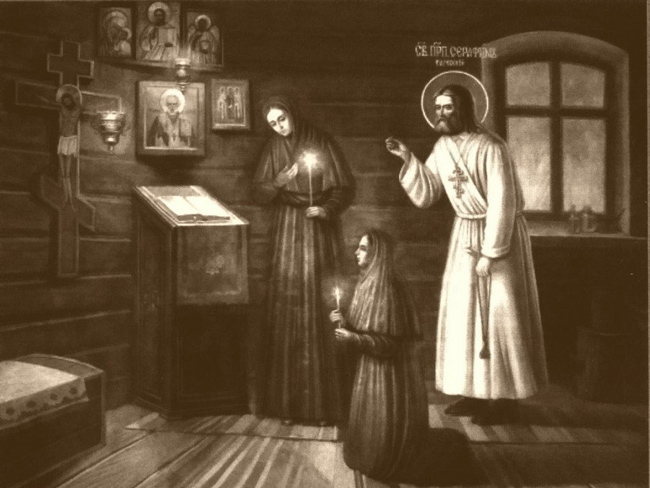
Attention and compunction are recognized as the gift of the Holy Spirit. Only the Spirit can stop the waves of the mind which runs every which way, said St. John of the Ladder [30]. Another Blessed Father said, “When compunction is with us, then God is with us” [31].
Having acquired constant attention and compunction in your prayers, attain the state of beatitude called poorness of spirit and weeping by the Gospel. You have already broken many chains of passions, already sensed the smell of spiritual freedom, already bear the pledge of salvation in your bosom. Do not abandon the narrows of the way of true prayer, and you will attain sacred repose, the mysterious sabbath; on the sabbath no earthly work is done; struggle and labor are set aside; in blessed passionlessness, outside dispersion, the soul stands before God in pure prayer, and by faith is at rest in Him in His endless goodness, by devotion to His all-holy will.
In him who struggles in prayer, success in prayer at first begins to appear by a special action of attention; from time to time it unexpectedly embraces the mind, encloses it in the words of the prayer. Afterwards it becomes far more constant and prolonged; the mind as if sticks to the words, is drawn by them into union with the heart. Finally compunction suddenly is combined with attention, and makes the person a temple of prayer, a temple of God.
Offer God quiet and humble prayers, and not ardent and flaming ones. When you become a mysterious priest of prayer, then you will enter into God’s tabernacle, and from there you will fill the censer of prayer with sacred fire. It is forbidden to offer unclean fire—blind, material heating of the blood—before the all-holy God.
The sacred fire of prayer, borrowed from God’s tabernacle, is holy love, poured into true Christians by the Holy Spirit [32]. He who makes the effort to join prayer with the fire of the blood, in his self-deception, deceived by his opinion of him self, thinks to carry out service to God, but actually he angers Him.
Do not seek delights in prayer; they are by no means appropriate for the sinner. The sinner’s wish to feel delight is already self-deception. Seek that your dead, hardened heart might come to life, that it might open fur the sensing of its sinfulness, of its fallenness, of its nothingness; that it might see its sins, plead guilty to them in self denial. Then the true fruit of prayer will appear within you, true repentance. You will groan before God and will cry cut to Him with prayer from the disastrous state of your soul which was suddenly revealed to you; you will cry out as from a prison, as from the grave, as from hell.
Repentance gives birth to prayer, and in a doubled amount is born of its own daughter.
Delight in prayer is the unique lot of the holy elect of God renewed by the Holy Spirit. He who is being enthralled by impulses of the blood, enthralled by vainglory and lust, invents delights for himself; he is in pitiful self-deception. The soul darkened by living according to the flesh is very inclined to such inventions—the soul which was deceived and is being deceived by its pride.
The sensations born of prayer and repentance consist of casing the conscience, of spiritual peace, of reconciliation with your neighbors and with the circumstances of your life, of mercy and sympathy for mankind, of restraint from passions, of cold ness towards the world, of submission to God, of strength in the struggle with sinful thoughts and impulses. Be satisfied with these sensations—in which, moreover, there is the taste of hope of salvation. Do not prematurely seek lofty spiritual states and ecstasies of prayer. In reality they are not at all what they seem to be to our imagination; the action of the Holy Spirit, from which lofty states of prayer appear, is inaccessible for the carnal mind [33].
Learn to pray with your whole intellect, with your whole soul, with all your strength. You ask: what does this mean? —One cannot know this except by experience. Strive constantly to be occupied by attentive prayer; attentive prayer will afford the answer to your question for you by blessed experience.
The labor of prayer seems burdensome, boring, dry for the mind accustomed to being occupied only by corruptible things. With toil the habit of prayer is acquired; when this habit is acquired, then It becomes a source of unceasing spiritual con solation.
Prayer, as was already said above, is the mother of all virtuosi obtain the mother; with her, her children will also come to the home of your soul; they will make it a sanctuary of God.
Before starting every deed, offer prayer to God; by this attract God’s blessing on your deeds, and by it judge your deeds. Deeds contrary to God’s commandments bring to a halt the contemplation of prayer.
He who turns to God in prayer for understanding, help, and blessing before every deed and word, carries out his life as if under the gaze of God, under His guidance. The habit of such behaviour is easy; there is nothing quicker than the mind, said Barsonuphius the Great; there is nothing easier than to raise, upon meeting every need, the mind to God (Answer 216).
In the difficult situations in life increase the frequency of your prayers to God. It is surer to have recourse to prayer than to the empty considerations of weak human reason, consideration, which for the most part turn out to be unrealizable. It is surer to lean on almighty God by faith and prayer than—by wavering considerations, and suppositions—on your own impotent reason.
Do not be imprudent in your petitions, so as not to anger God by your lack of reason; he who asks something low or worthless of the King of kings abases Him. The Israelites, ignoring God’s miracles performed in. the desert for them, asked for the fulfillment of their belly’s desires—but while the meat was yet in their mouths, the wrath of God came upon them [34].
Offer God petitions in conformance with His greatness. Solomon asked wisdom of Him; he received it, and with it a multitude of other good things, because he asked wisely. Elisha asked of Him the grace of the Holy Spirit doubled before his great teacher, and his petition was accepted.

He who seeks in his prayer the corruptible goods of the earth arouses the indignation of the Heavenly King against himself. The Angels and Archangels—these are His magnates—gaze upon you at the time of your prayers; they behold what you ask of God. They wonder and rejoice when they see an earthly being leaving his earth and offering a petition to receive some thing heavenly; they sorrow at the opposite of this, at him who does not pay attention to the heavenly and asks things of the earth and corruption.
We are commanded to be children in malice, but not in understanding [35]. In prayer the reasoning of this world, verbacious and conceited, is repudiated; from this it does not follow that feeblemindedness is adapted to or required in prayer. Perfect intelligence is required in it, spiritual intelligence, full of humility and simplicity, often expressed in prayer not by words but by a prayerful silence far higher than words. Prayerful silence overcomes the mind, when suddenly there stand before it new, spiritual conceptions inexpressible in the words of this world and age, when there appears a peculiarly alive sensation of God being present. Before the incomprehensible greatness of Divinity His impotent creation, man, falls silent.
The verbocity [36], condemned by the Lord in the prayers of the heathen, consists of numerous petitions for temporal goods, which fill the prayers of the heathen, and in that oratorical exposition in which they are offered [37]—as if rhetorical ornamentations, material sonority, and the verbal style can act on God just as they act on the hearing and nerves of carnal men. Condemning this verbocity, the Lord by no means condemned prolonged prayers, as it seemed to certain, heretics; He Himself sanctified prolonged prayer by spending long periods of time in prayer. And He continued all night in prayer to God, the Gospel relates of the Lord [38].
The lengthiness of the prayers of God’s saints is not from verbocity, but from abundant spiritual sensations which appear in. them during prayer. By the abundance and power of such sensations, time, so to say, is destroyed, thus being transfigured for the saints of God into eternity.
When the man of prayer attains success in his blessed labor, then the variety of thoughts in the psalms and other prayers become incompatible with his state. The prayer of the publican and other very brief prayers express more satisfactorily the in expressible, extensive desire of the heart, and. often the saints of God spent many hours, days, and years in such prayer, not feeling the need of variety of thoughts for their powerful, concentrated prayer [39].
The prayers composed by heretics have much in common with the prayers of the heathen; there is verbocity in them; there is earthly beauty of words in them; there is heating of the blood in them; there is the insufficiency of repentance in them; there is the yearning for the wedding of the Son of God directly from the brothel of passions in them; there is self-deception in them. They are alien to the Holy Spirit; from them blows the fatal infection of the dark spirit, the evil spirit, the spirit of falsehood and ruin.
Great is the occupation of prayer! The Holy Apostles, for the sake of prayer and for the sake and of serving the Word refused service to their neighbors in their bodily needs. It is not reason, they said, that we should leave the word of God and serve tables…. We will give ourselves continually to prayer and to the ministry of the Word [40], that is, in conversation with God in prayer and in conversation about God with their neighbors, informing them of the Tri-substantial God and God the Word become man.
The occupation of prayer is the highest occupation for the mind of man; the state of purity, alien to entertainment, attained for the mind by prayer, is its highest natural state; its being carried on high to God, for which the first principle is pure prayer, is a state above nature [41].
Into the super-natural state enter only the saints of God, renewed by the Holy Spirit, stripped of the old Adam, clothed in the New, capable of with open face beholding as in a mirror the glory of the Lord, being changed unto the same image from glory to glory by the action of the Spirit of the Lord [42]. They receive the greater part of Divine revelations during the exercise of prayer, as in such a time, the soul is especially prepared, especially cleansed, attuned to intercourse with God [43]. Thus the holy Apostle Peter at the time of prayer saw the famous sheet descending from heaven [44]. Thus at the time of prayer the Angel appeared to Cornelius the centurion [45]. Thus, when the Apostle Paul was praying in the temple in Jerusalem, the Lord appeared to him and commanded him to leave Jerusalem at once: Depart, for I will send thee far hence unto the Gentiles, He said to him [46].
Prayer is commanded by God, just, as is repentance. There is one end appointed for prayer just as for repentance: entrance into the kingdom of heaven, into the kingdom of God, which is within us. Repent, for the kingdom of heaven is at hand [47]. The kingdom of God is within you [48]. Ask and it shall be given you; seek, and ye shall find; knock, and it shall be opened unto you. For everyone that asketh receiveth; and he that seeketh findeth and to him that knocketh it shall be opened. Your heavenly Father shall give the Holy Spirit to them that ask Him [49]. And shall not God avenge His own elect, which cry day and night unto Him and complaining against the violence done them by infection and demons? I tell you that He will avenge them speedily [50]. The entrance into the heavenly kingdom, which by holy baptism is planted in the heart of every Christian, is the development of this kingdom by the action of the Holy Spirit.
Hasten by prayer, soul thirsting for salvation, hasten after the Saviour, accompanied by His numberless disciples. Call after Him by prayer like the Canaanite woman [51]. Do not be grieved by His prolonged inattention; magnanimously and humbly endure the sorrows and insults, which He permits you on the way of prayer. For success in prayer there is the unfailing need for help from temptation. According to your faith, for your humility, for the persistance of your prayer, He will console you by healing your daughter possessed by the action of passions—by healing your thoughts and feelings having recreated them from passionate to passionless, from sinful to holy, from carnal to spiritual. Amen.

[1] The Ladder, Title of Step 28. St. Macarius of Egypt, Word 3, Chapter 1.
[2] The Ladder, Step 28, 7
[3] The LORD preserveth the simple: I was brought low, and he helped me. Return unto thy rest, O my soul; for the LORD hath dealt bountifully with thee. For thou hast delivered my soul from death, mine eyes from tears, and my feet from falling. will walk before the LORD in the land of the living. I believed, therefore have I spoken: I was greatly afflicted: said in my haste, All men are liars. What shall I render unto the LORD for all his benefits toward me? I will take the cup of salvation, and call upon the name of the LORD. Psalm 116 6–13
[4] And Jesus answering saith unto them, Have faith in God. For verily I say unto you, That whosoever shall say unto this mountain, Be thou removed, and be thou cast into the sea; and shall not doubt in his heart, but shall believe that those things which he saith shall come to pass; he shall have whatsoever he saith. Therefore I say unto you, What things soever ye desire, when ye pray, believe that ye receive them, and ye shall have them. And when ye stand praying, forgive, if ye have ought against any: that your Father also which is in heaven may forgive you your trespasses. But if ye do not forgive, neither will your Father which is in heaven forgive your trespasses. Mark 11 22–26
[5] And he spake a parable unto them to this end, that men ought always to pray, and not to faint; Saying, There was in a city a judge, which feared not God, neither regarded man: And there was a widow in that city; and she came unto him, saying, Avenge me of mine adversary. And he would not for a while: but afterward he said within himself, Though I fear not God, nor regard man; Yet because this widow troubleth me, I will avenge her, lest by her continual coming she weary me. And the Lord said, Hear what the unjust judge saith. And shall not God avenge his own elect, which cry day and night unto him, though he bear long with them? I tell you that he will avenge them speedily. Nevertheless when the Son of man cometh, shall he find faith on the earth? And he spake this parable unto certain which trusted in themselves that they were righteous, and despised others: Two men went up into the temple to pray; the one a Pharisee, and the other a publican. The Pharisee stood and prayed thus with himself, God, I thank thee, that I am not as other men are, extortioners, unjust, adulterers, or even as this publican. I fast twice in the week, I give tithes of all that I possess. And the publican, standing afar off, would not lift up so much as his eyes unto heaven, but smote upon his breast, saying, God be merciful to me a sinner. I tell you, this man went down to his house justified rather than the other: for every one that exalteth himself shall be abased; and he that humbleth himself shall be exalted. Luke 18 1–14
[6] The Ladder, Step 7, 11
[7] The Ladder, Step 28. ch. 7.
[8] Psalm 116 1
[9] Mark 11 24
[10] Luke 18 1
[11] Luke 18 3
[12] The Ladder, Step 7. ch. 11.
[13] Luke 18 7
[14] From whence come wars and fightings among you? come they not hence, even of your lusts that war in your members? Ye lust, and have not: ye kill, and desire to have, and cannot obtain: ye fight and war, yet ye have not, because ye ask not. Ye ask, and receive not, because ye ask amiss, that ye may consume it upon your lusts. Ye adulterers and adulteresses, know ye not that the friendship of the world is enmity with God? whosoever therefore will be a friend of the world is the enemy of God. Do ye think that the scripture saith in vain, The spirit that dwelleth in us lusteth to envy? But he giveth more grace. Wherefore he saith, God resisteth the proud, but giveth grace unto the humble. Submit yourselves therefore to God. Resist the devil, and he will flee from you. James 14 1–7
[15] And Samuel did that which the LORD spake, and came to Bethlehem. And the elders of the town trembled at his coming, and said, Comest thou peaceably? And he said, Peaceably: I am come to sacrifice unto the LORD: sanctify yourselves, and come with me to the sacrifice. And he sanctified Jesse and his sons, and called them to the sacrifice. And it came to pass, when they were come, that he looked on Eliab, and said, Surely the LORD’S anointed is before him. But the LORD said unto Samuel, Look not on his countenance, or on the height of his stature; because I have refused him: for the LORD seeth not as man seeth; for man looketh on the outward appearance, but the LORD looketh on the heart. I Samuel 16 4–7
[16] Ps. 88
[17] And in the morning, as they passed by, they saw the fig tree dried up from the roots. And Peter calling to remembrance saith unto him, Master, behold, the fig tree which thou cursedst is withered away. And Jesus answering saith unto them, Have faith in God. For verily I say unto you, That whosoever shall say unto this mountain, Be thou removed, and be thou cast into the sea; and shall not doubt in his heart, but shall believe that those things which he saith shall come to pass; he shall have whatsoever he saith. Therefore I say unto you, What things soever ye desire, when ye pray, believe that ye receive them, and ye shall have them. And when ye stand praying, forgive, if ye have ought against any: that your Father also which is in heaven may forgive you your trespasses. But if ye do not forgive, neither will your Father which is in heaven forgive your trespasses. Mark 11 20–26
[18] Word 89
[19] St. Cassian, Word on Reasoning, Philokalia, pt. 4.
[20] St Isaac the Syrian, Word 85
[21] Ibid. Word 11
[22] St. Isaac the Syrian. Word 56, 57
[23] Ps. 104 7
[24] St. Symeon the New Thelogian, Word on Three Methods of Prayer, Philokalia, Pt. 1.
[25] The Ladder, Step 28, 17
[26] Callistus and Ignatius of Xanthipoulos, Philolalia, Pt. 5. Chapter 24.
[27] This saint’s essay “On Prayer” is included in the book Klasy, published by the Optina Hermitage.
[28] St. Gregory of Sinai, On Deception: beneficial chapters, Philokalia, Pt. 1.
[29] Word of St. Symeon on Three Types of Prayer.
[30] The Ladder, Step 28, 17
[31] Hieromonk Seraphim of Sarov
[32] Therefore being justified by faith, we have peace with God through our Lord Jesus Christ: By whom also we have access by faith into this grace wherein we stand, and rejoice in hope of the glory of God. And not only so, but we glory in tribulations also: knowing that tribulation worketh patience; And patience, experience; and experience, hope: And hope maketh not ashamed; because the love of God is shed abroad in our hearts by the Holy Ghost which is given unto us. For when we were yet without strength, in due time Christ died for the ungodly. For scarcely for a righteous man will one die: yet peradventure for a good man some would even dare to die. But God commendeth his love toward us, in that, while we were yet sinners, Christ died for us. Romans 5 1–8
[33] St. Isaac the Syrian, Word 55
[34] Ps. 77 30–31. This paragraph and the two following are borrowed from the Fifth Word of St. Isaac the Syrian.
[35] I thank my God, I speak with tongues more than ye all: Yet in the church I had rather speak five words with my understanding, that by my voice I might teach others also, than ten thousand words in an unknown tongue. Brethren, be not children in understanding: howbeit in malice be ye children, but in understanding be men. In the law it is written, With men of other tongues and other lips will I speak unto this people; and yet for all that will they not hear me, saith the Lord. Wherefore tongues are for a sign, not to them that believe, but to them that believe not: but prophesying serveth not for them that believe not, but for them which believe. I Corinthians 14 18–22
[36] And when thou prayest, thou shalt not be as the hypocrites are: for they love to pray standing in the synagogues and in the corners of the streets, that they may be seen of men. Verily I say unto you, They have their reward. But thou, when thou prayest, enter into thy closet, and when thou hast shut thy door, pray to thy Father which is in secret; and thy Father which seeth in secret shall reward thee openly. But when ye pray, use not vain repetitions, as the heathen do: for they think that they shall be heard for their much speaking. Be not ye therefore like unto them: for your Father knoweth what things ye have need of, before ye ask him. Matthew 6 5–8
[37] According to the explanation of Blessed Theophylact the Bulgarian
[38] And it came to pass in those days, that he went out into a mountain to pray, and continued all night in prayer to God. And when it was day, he called unto him his disciples: and of them he chose twelve, whom also he named apostles. Luke 6 12–13
[39] Hieromonk Seraphim of Sarov, a monk especially accomplished in prayer, spent a thousand days and a thousand nights standing on a rock and crying to the Lord: God, be merciful to me a sinner! Sayings of the life and labors of Fr. Seraphim, Moscow, 1844 edition.
[40] And in those days, when the number of the disciples was multiplied, there arose a murmuring of the Grecians against the Hebrews, because their widows were neglected in the daily ministration. Then the twelve called the multitude of the disciples unto them, and said, It is not reason that we should leave the word of God, and serve tables. Wherefore, brethren, look ye out among you seven men of honest report, full of the Holy Ghost and wisdom, whom we may appoint over this business. But we will give ourselves continually to prayer, and to the ministry of the word. Acts 6 1–4
[41] The Ladder, Step 28
[42] For if that which is done away was glorious, much more that which remaineth is glorious. Seeing then that we have such hope, we use great plainness of speech: And not as Moses, which put a vail over his face, that the children of Israel could not stedfastly look to the end of that which is abolished: But their minds were blinded: for until this day remaineth the same vail untaken away in the reading of the old testament; which vail is done away in Christ. But even unto this day, when Moses is read, the vail is upon their heart. Nevertheless when it shall turn to the Lord, the vail shall be taken away. Now the Lord is that Spirit: and where the Spirit of the Lord is, there is liberty. But we all, with open face beholding as in a glass the glory of the Lord, are changed into the same image from glory to glory, even as by the Spirit of the Lord. II Corinthians 3 11–18
[43] St Isaac the Syrian, Word 16
[44] There was a certain man in Caesarea called Cornelius, a centurion of the band called the Italian band, A devout man, and one that feared God with all his house, which gave much alms to the people, and prayed to God alway. He saw in a vision evidently about the ninth hour of the day an angel of God coming in to him, and saying unto him, Cornelius. And when he looked on him, he was afraid, and said, What is it, Lord? And he said unto him, Thy prayers and thine alms are come up for a memorial before God. And now send men to Joppa, and call for one Simon, whose surname is Peter: He lodgeth with one Simon a tanner, whose house is by the sea side: he shall tell thee what thou oughtest to do. And when the angel which spake unto Cornelius was departed, he called two of his household servants, and a devout soldier of them that waited on him continually; And when he had declared all these things unto them, he sent them to Joppa. On the morrow, as they went on their journey, and drew nigh unto the city, Peter went up upon the housetop to pray about the sixth hour: And he became very hungry, and would have eaten: but while they made ready, he fell into a trance, And saw heaven opened, and a certain vessel descending unto him, as it had been a great sheet knit at the four corners, and let down to the earth. Acts 10 1–11
[45] Acts 10 3
[46] And it came to pass, that, when I was come again to Jerusalem, even while I prayed in the temple, I was in a trance; And saw him saying unto me, Make haste, and get thee quickly out of Jerusalem: for they will not receive thy testimony concerning me. And I said, Lord, they know that I imprisoned and beat in every synagogue them that believed on thee: And when the blood of thy martyr Stephen was shed, I also was standing by, and consenting unto his death, and kept the raiment of them that slew him. And he said unto me, Depart: for I will send thee far hence unto the Gentiles. Acts 22 17–21
[47] Now when Jesus had heard that John was cast into prison, he departed into Galilee; And leaving Nazareth, he came and dwelt in Capernaum, which is upon the sea coast, in the borders of Zabulon and Nephthalim: That it might be fulfilled which was spoken by Esaias the prophet, saying, The land of Zabulon, and the land of Nephthalim, by the way of the sea, beyond Jordan, Galilee of the Gentiles; The people which sat in darkness saw great light; and to them which sat in the region and shadow of death light is sprung up. From that time Jesus began to preach, and to say, Repent: for the kingdom of heaven is at hand. Matthew 4 12–17
[48] And when he was demanded of the Pharisees, when the kingdom of God should come, he answered them and said, The kingdom of God cometh not with observation: Neither shall they say, Lo here! or, lo there! for, behold, the kingdom of God is within you. Luke 17 20–21
[49] And he said unto them, Which of you shall have a friend, and shall go unto him at midnight, and say unto him, Friend, lend me three loaves; For a friend of mine in his journey is come to me, and I have nothing to set before him? And he from within shall answer and say, Trouble me not: the door is now shut, and my children are with me in bed; I cannot rise and give thee. I say unto you, Though he will not rise and give him, because he is his friend, yet because of his importunity he will rise and give him as many as he needeth. And I say unto you, Ask, and it shall be given you; seek, and ye shall find; knock, and it shall be opened unto you. For every one that asketh receiveth; and he that seeketh findeth; and to him that knocketh it shall be opened. If a son shall ask bread of any of you that is a father, will he give him a stone? or if he ask a fish, will he for a fish give him a serpent? Or if he shall ask an egg, will he offer him a scorpion? If ye then, being evil, know how to give good gifts unto your children: how much more shall your heavenly Father give the Holy Spirit to them that ask him? Luke 11 5–13
[50] And the Lord said, Hear what the unjust judge saith. And shall not God avenge his own elect, which cry day and night unto him, though he bear long with them? I tell you that he will avenge them speedily. Nevertheless when the Son of man cometh, shall he find faith on the earth? Luke 18 6–8
[51] Then Jesus went thence, and departed into the coasts of Tyre and Sidon. And, behold, a woman of Canaan came out of the same coasts, and cried unto him, saying, Have mercy on me, O Lord, thou Son of David; my daughter is grievously vexed with a devil. But he answered her not a word. And his disciples came and besought him, saying, Send her away; for she crieth after us. But he answered and said, I am not sent but unto the lost sheep of the house of Israel. Then came she and worshipped him, saying, Lord, help me. But he answered and said, It is not meet to take the children’s bread, and to cast it to dogs. And she said, Truth, Lord: yet the dogs eat of the crumbs which fall from their masters’ table. Then Jesus answered and said unto her, O woman, great is thy faith: be it unto thee even as thou wilt. And her daughter was made whole from that very hour. Matthew 15 21–28

Orthodox Life, No. 2, March-April 1968, pp. 12-24
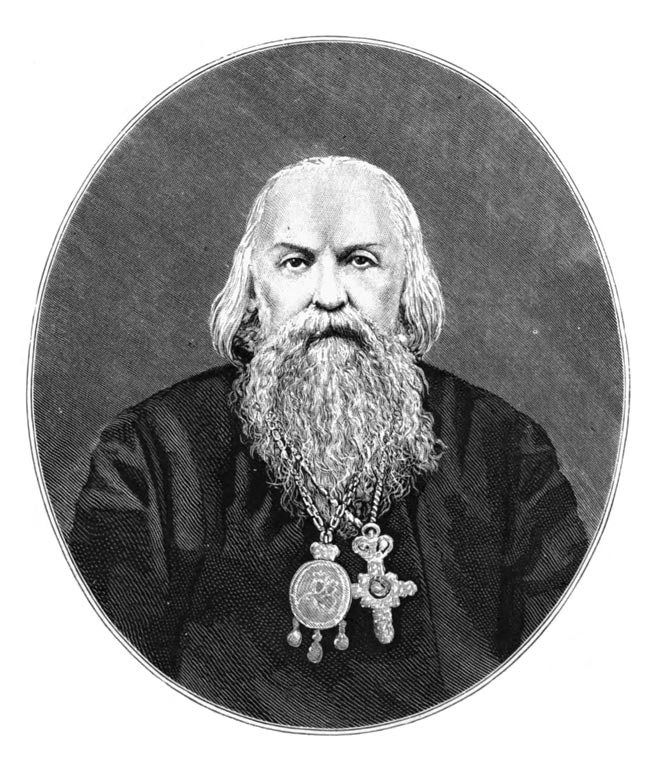


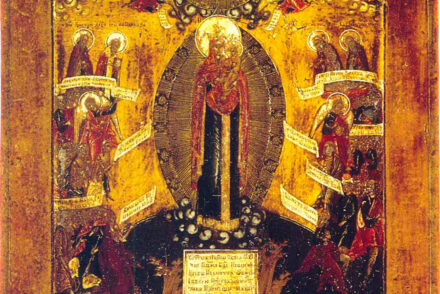

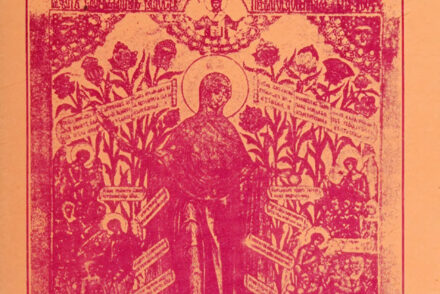
Pas de commentaire